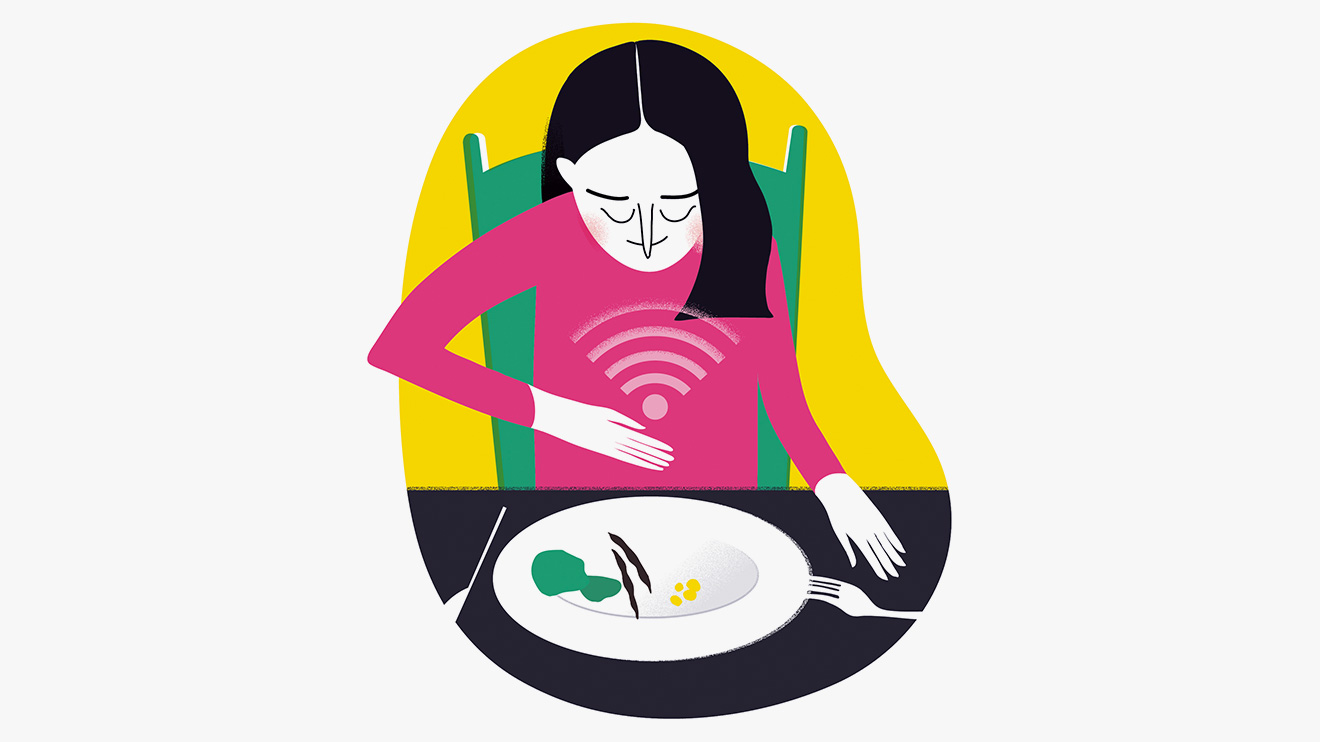Connecting to your body
Connected. It is a word that is often used to describe our current zeitgeist. My generation grew up with computers and the Internet. Social media was an integral part of our teenage years, and we continue to frequent it compulsively—me included. Surprisingly, while we are very attentive to the alert sound of our cellphone, which tells us that our friend has just commented on the photo of our ice cream cone, we are much less attentive to the messages sent out by our own bodies.
For many people, external signals have as much, if not more, influence on what they eat than body signals. The food and advertorial industries understand this and have placed an abundance of mouth-watering food items clearly visible in our immediate environments. The goal? To make us eat more...even when we’re not hungry. At the same time, according to a survey conducted by the ÉquiLibre group in 2021, 65% of Quebecers want to lose weight, regardless of their actual weight.

Intuitive eating is a positive approach that seeks to make us aware of these external influences and puts an end to this continual struggle with our body. It is based on what researchers call “the new paradigm on weight,” even though the latter dates back to the 1980s. This view of food attempts to eliminate the concept of diet and leans instead towards better self-acceptance. Eating intuitively means learning to reconnect with our body’s hunger and satiety signals. The latter may not have a “ding” or a small light to warn us, but it has a whole arsenal of notifications that everyone would benefit from paying more attention to. In order to see more clearly, I asked Karine Gravel, nutritionist, doctor of nutrition and author of the book De la culture des diètes à l’alimentation intuitive to guide me through the ten main principles that govern intuitive eating.
1. Reject the culture of diets
When you stop yourself from eating what you love, to try to lose weight or to avoid gaining weight, inevitably, you end up losing control. That’s why people struggling with this can fall into a vicious circle and accumulate diets. Unfortunately, the majority of people who lose weight through a diet regain the weight lost in the years that follow.
One of the foundations of intuitive eating is first to understand that it’s not our fault that diets have failed, even if the diet industry tries to make us believe otherwise. Rather, it is the means undertaken that are not effective.
Intuitive eating should not be seen as a new diet,” explains Gravel. You can’t keep one foot on the side of weight-loss diets, waiting for a new method to arrive, and another in intuitive eating.
When you embark on this approach, you have to enter it knowing that diets do not work.
2. Honour your hunger
Yes, the best way to calm hunger is to eat. If the concept seems simplistic, it must be understood that many people who follow diets prevent themselves from eating, even when their body cries of famine. Conversely, some eat automatically, without really feeling hungry. For example, eating simply because it’s dinner time is not listening to your body and its needs.
Our body is well made, it tells us when it’s time,” says Gravel of when to eat.
The small rumble in your stomach is one of the first signs sent by your body. If you wait a little while, the small rumble will turn into hunger. On the other hand, if you wait too long before listening to this signal, you become hungry and feel like you must eat immediately. It is advisable not to starve yourself before sitting down. Try to eat when your hunger is moderate, that is, you don’t feel that you’re “starving.”
3. Make peace with food
You can eat whatever you want. Reading these words, many will smile. Others will say it is unthinkable. That if they had permission to eat what they wanted, it would be chocolate cake or chips at will!
“We give ourselves permission to eat our desired foods in the presence of hunger. And at that moment, we can only think about the foods that could really satisfy,” says Gravel. Those who believe that allowing oneself to eat what one wants inevitably leads to a less nutritious diet are wrong: “In the scientific literature, there are direct associations between the adoption of intuitive eating and food variety, as well as with greater vegetable consumption, she argues.
4. Stop categorizing foods
As we all know, some foods are more nutritious than others. However, categorizing foods as “good” or “bad” does not reflect reality, is not helpful, and can even be harmful, explains Gravel. When you classify foods into two categories, you will be proud to have eaten the “good” foods and you will feel guilty about eating the “bad” ones. And when there is guilt, there is a negative relationship with food.
5. Discover the pleasure of eating
You can also focus on the sensory characteristics of food. Is it sweet? Salty? Is the texture creamy? Crisp? “The more we are in our head, questioning what we should eat, the less we focus on what would really satiate us. For people who go on diets, it’s often completely set aside because they always feel guilty about eating," says Gravel.
For example, if you really want to eat chocolate, try to fool yourself into believing that an apple will fill that craving. It is the chocolate flavour that’s tempting you, and it is this flavour that you must seek out.
We often hear about another approach called mindful eating. The latter is actually very similar to intuitive eating. They have the same objective, that of reconnecting with one's body and the signals it sends us. Instead of focusing on the content of the plate, it takes a holistic view of food, which includes emotions. Mindful eating, however, also features a meditation component.
6. Consider feeling full
The body has tools to tell us when it has had enough. “Often, people eat too fast, but not out of obligation, out of simple habit,” says Gravel. Watching TV or keeping your cellphone at the table totally disconnects you from the present moment. It doesn’t give you time to enjoy food or let your body signal that it’s had enough.
Gravel recommends paying attention to pleasure when eating. The exercise consists of paying special attention to food and the pleasure it gives you during a meal. Generally, the first bites are the best and the more the meal progresses, the more the pleasure decreases. This fading pleasure is a sign that satiety is setting in. Take the test!
7. Experience your emotions with kindness
“The weight loss industry says we have to silence our emotions. If we were robots, it would work. But we are humans and that is what makes us beautiful. We will always have emotions. We must welcome them,” says Gravel. For example, some people eat because they are stressed or because they are tired. The ideal would be to pinpoint the cause of this stress or fatigue and fix it, rather than eating without questioning, hence the importance of not excluding emotions from the equation.
8. Respect your body
You shouldn’t wait until you’ve lost 20 pounds to love yourself. Otherwise, you will waste your time belittling yourself,” says Gravel.
Rather, we should learn to value and respect ourselves right away. Having a more positive than negative body image will help lead to equally positive actions for the body.
9. Feel the benefits of physical activity
Doing sports just to burn calories doesn’t work. “Physical activity doesn’t have the same effect on everyone. If you only do sports to lose weight, it’s not going to last. If you do it because it makes you feel good and you feel healthy, that’s something else,” says Gravel.
10. Honour your health and your taste buds
You must stop believing that you eat either for health or for pleasure. Intuitive eating is not a concept opposed to health. On the contrary, more and more studies are observing the following impacts in people who adopt intuitive eating:
- They eat more slowly;
- They have lower blood pressure;
- They suffer less from eating disorders;
- They show less body dissatisfaction;
- They have less anxiety and concern about food.
Intuitive eating can lead to a lot of good, but you don’t have to think that you should change everything overnight. It is always by taking one step at a time that sustainable habits are established. “Yes, these recommendations exist, but the goal is to go gradually, each at your own pace, and make changes for the good,” concludes Gravel. In other words, when it comes to food, trust your gut.


